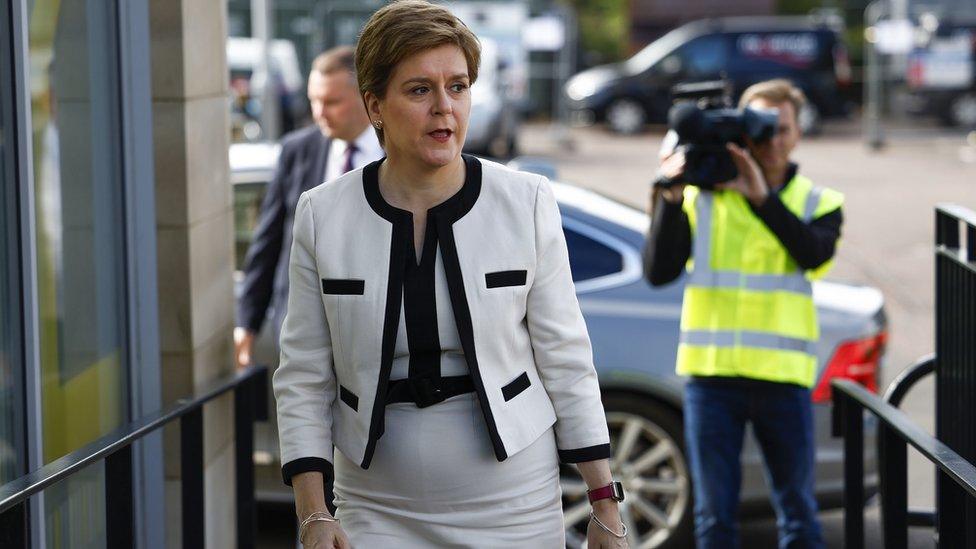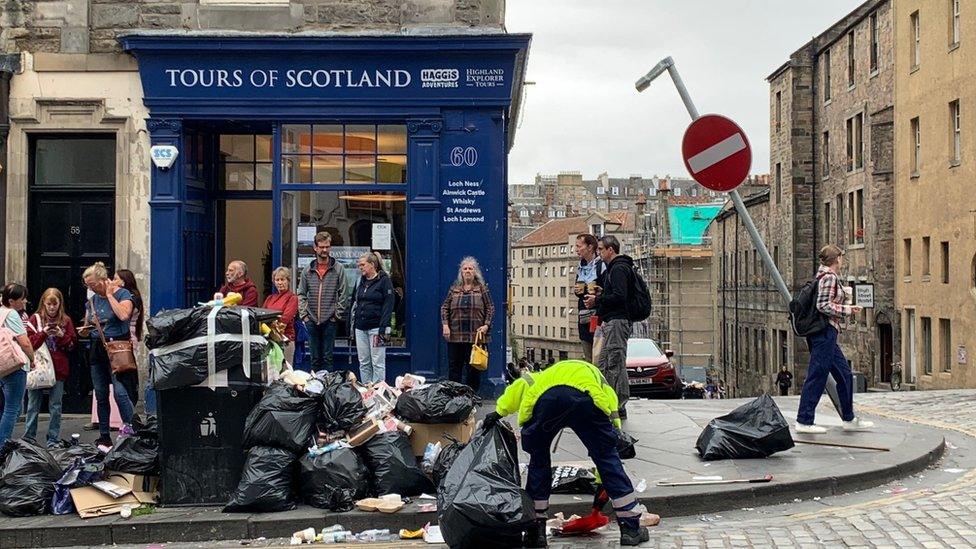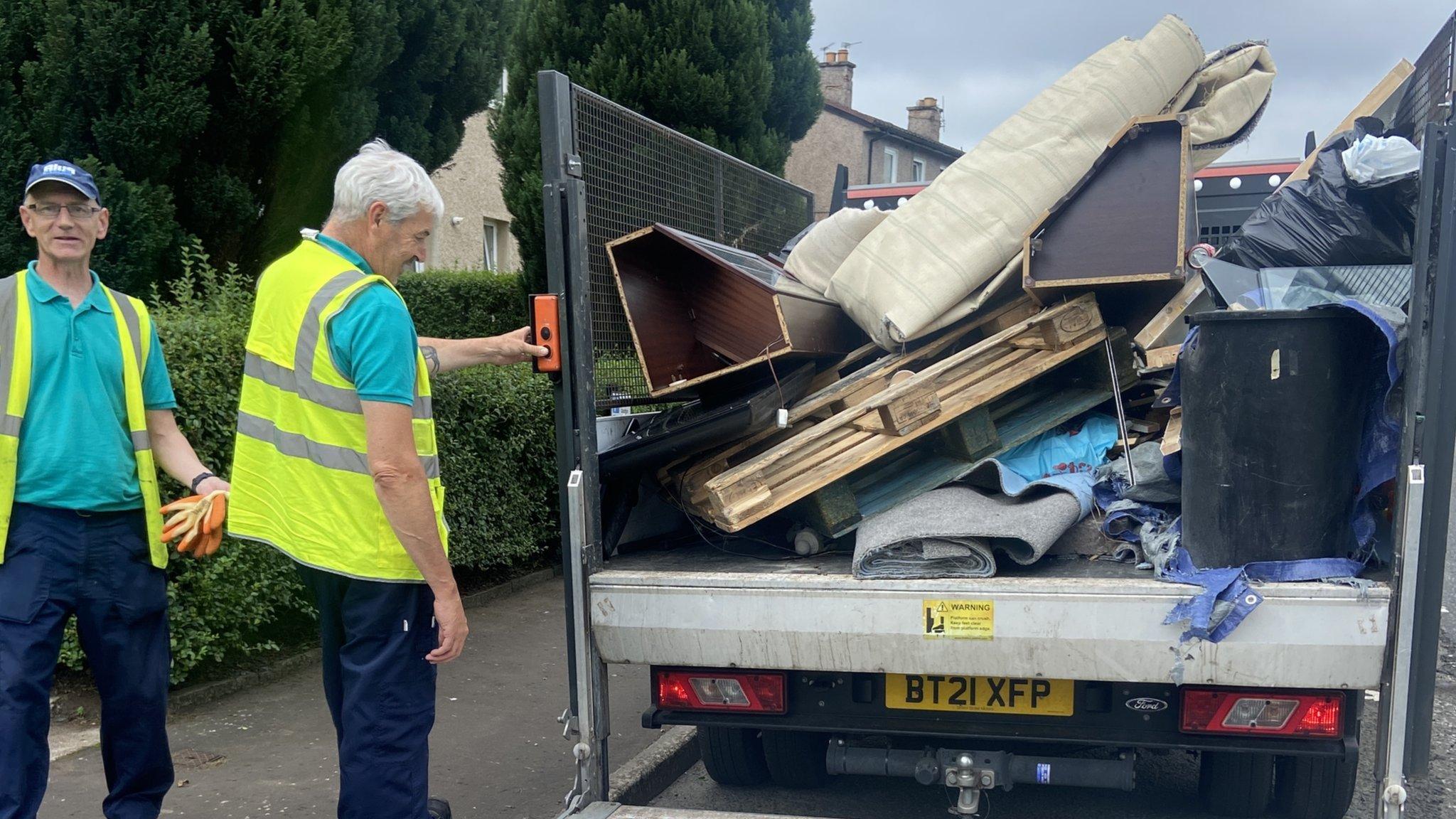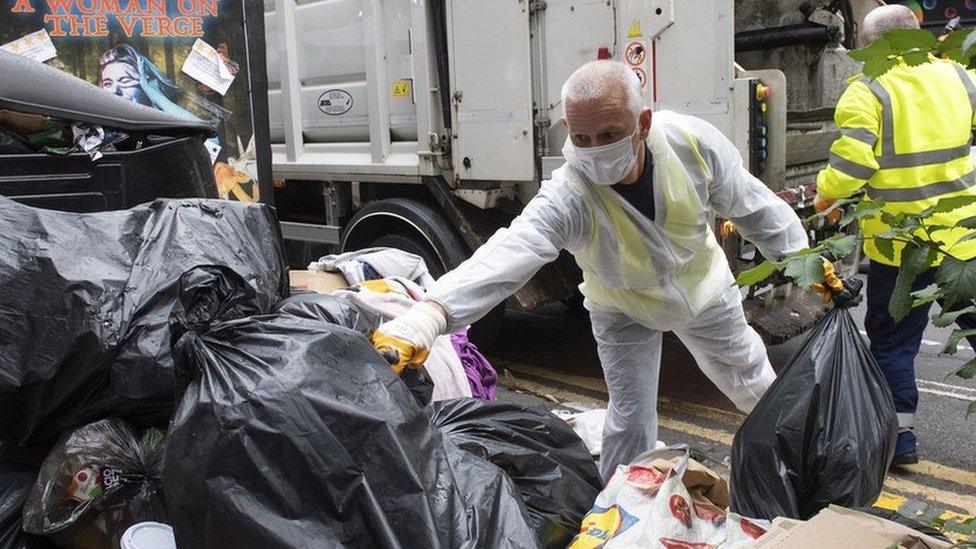Unions call off Scottish school and bin strikes
- Published
- comments

The first wave of strikes by refuse workers last month left bins overflowing in several Scottish cities
Strikes that had been due to close hundreds of schools and leave bins unemptied across Scotland next week have been called off.
A new offer will mean a 10% pay rise for the lowest paid staff instead of special cost of living payments this year and next.
Non-teaching school staff in 11 council areas had been due to go on strike for three days next week.
Refuse workers had also been due to begin a fresh round of strikes.
The Unison, GMB and Unite unions all said they had suspended their industrial action while they consult their members on the new pay offer, and that they were recommending the deal is accepted.
It follows an 11-hour meeting between unions and council leaders that was hosted by First Minister Nicola Sturgeon in Edinburgh on Thursday.
The unions had rejected an increased pay offer earlier this week.
Cosla said at the time it was disappointed that the unions had turned down a deal that was at the "absolute extremes" of affordability, while Ms Sturgeon warned there was no "bottomless pit" of money to pay for an improved offer.

What is included in the new offer?
An increase of £2,000 for those earning up to £20,500
An increase of £1,925 for those earning between £20,500 to £39,000
A 5% increase for those earning between £39,000 to £60,000
A maximum increase of £3,000 for those earning above £60,000
The removal of social care registration fees
One extra day of annual leave
All increases will be based on a 36 hour week calculator

Councillor Katie Hagmann, Cosla's human resources spokeswoman, said the revised offer showed that councils had "listened to the concerns of our workforce and have responded positively".
She added: "Council leaders have said consistently throughout these negotiations that we very much value and are grateful to the local government workforce."

Nicola Sturgeon intervened in the pay dispute between unions and Cosla
Ms Sturgeon said the Scottish government would have to make difficult choices to help pay for the pay deal.
She told BBC Scotland: "I hope union members will now accept this offer, I think this is a good deal for workers in really difficult circumstances.
"People are struggling and obviously it is a good deal for the public because it averts any possibility of industrial action and I'm particularly grateful to trade unions for suspending the strike action planned for next week.
"The Scottish government has a finite budget so there are going to be some difficult decisions to support this deal but it is important we do support the best deals for workers."
Scottish Labour's local government spokesman Mark Griffin said it was "simply not good enough that it took weeks of industrial action to embarrass the SNP government into action".
Scottish Conservative Party Chairman, Craig Hoy MSP, said Nicola Sturgeon was "missing in action for weeks" and the strikes should have been stopped a lot sooner.
'Not a perfect offer'
Bin strikes began in Edinburgh on 18 August after unions rejected an initial pay offer equivalent to a 3.5% increase.
The action escalated last week when workers at a further 20 local authorities walked out despite a revised 5% offer.
Unison said 80% of their members would now get pay rises of between 5% and 10%, which it described as a victory.
Johanna Baxter, the union's head of local government, said: "It is only through the collective action of our members in school and early years staff threatening strike action and our waste and recycling workers taking action that we have forced these extra funds out of government and the employer."
A GMB Scotland spokesman said the new offer was a "significant amount of consolidated money" for workers including the "frontline refuse and school staff that everyone depends on".
Keir Greenaway, the union's senior organiser for public services, said: "It is not a perfect offer but it is the view of GMB Scotland's local government committee that it's worthy of members consultation and their acceptance".
Unite said the direct intervention of the first minister had been a primary reason for the breakthrough, and that it now had a "credible offer which our local government representatives can recommend to the membership for acceptance."
Meanwhile, Scotland's largest teaching union is recommending that its members vote in favour of strike action in a dispute over pay.
The Educational Institute of Scotland (EIS) has started a consultative ballot on the current 5% pay rise offered by council employers.
- Published30 August 2022

- Published1 August 2023

- Published31 August 2022

- Published30 August 2022
